Heckrath family from Mainz, Germany, & South Africa

Table Bay, Cape Colony. Late 18C
Edmund Ignatius Heckrath
1736-abt 1802
The Heckrath family came from Mainz in Germany. It is on the River Rhine and is where the first printing press with movable type was invented by Johannes Gutenberg in the 15th Century. Mainz was founded by the Romans. Edmund Ignatius Heckrath was my 4x great grandfather. In April 1736 he was baptized in St. Christoph’s Church, Mainz, which was destroyed in WWII and is now a ruined war memorial. The font, from the Gothic period, is still there and it is thought that Gutenberg was baptized in this church more than 300 years earlier since it was his parish church.
Edmund’s father was Sebastian Heckrad [In Germany this was how the surname was recorded and probably changed when that area of Germany was under French rule] and his mother’s first name was Charitas. I don’t know any more about his parents except they had at least three boys for whom there are records.
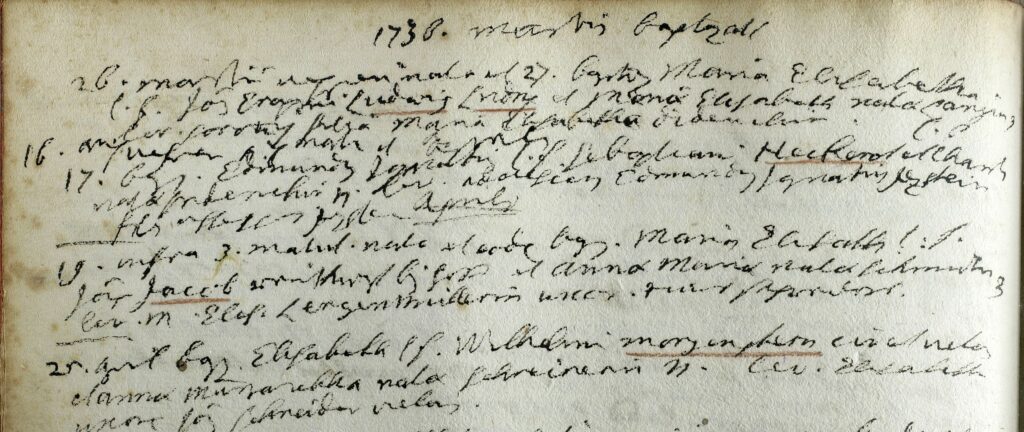
Baptismal record for Edmund Ignatius Heckrad
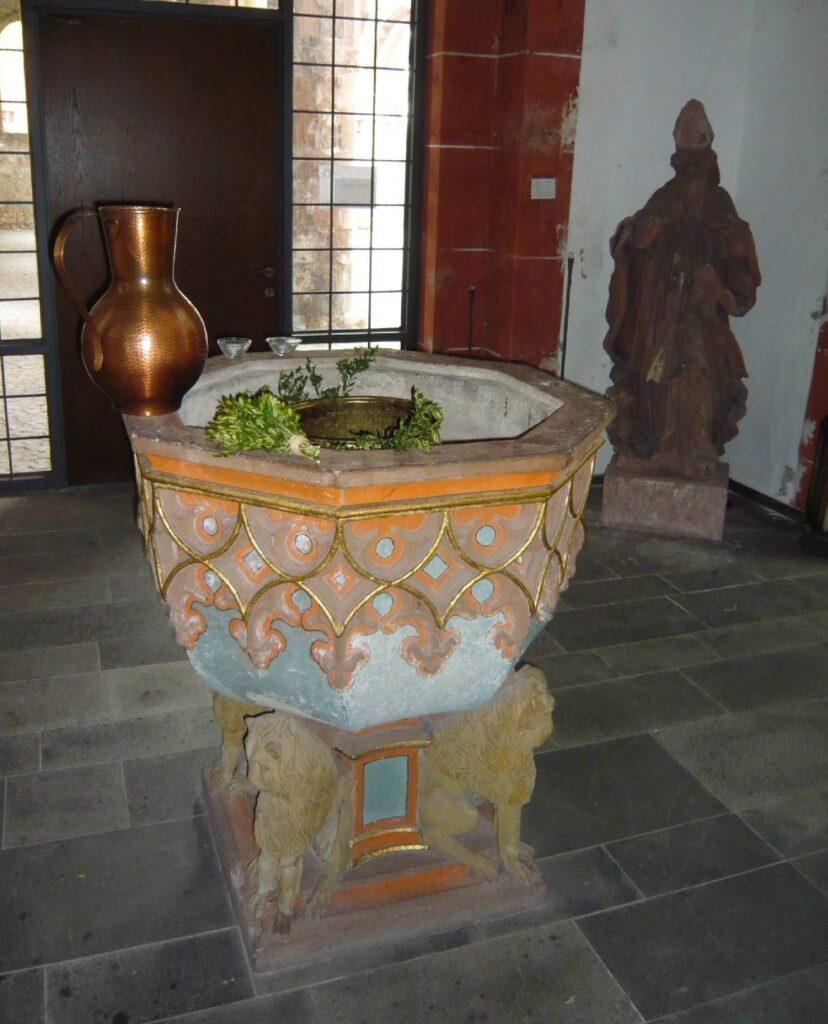
Baptismal font in St. Christoph’s Church, Mainz

St. Christoph’s Church, Mainz, which is now a war memorial to those who died in WWII
Edmund married Maria Margaretha Nymphius about 1759 and they had ten children however not all lived to adulthood. His firstborn son, Sebastianus Ignatius Jacobus Adolphus, was born in 1760 and died in 1764. They had 4 boys and 6 girls. However his son, Ernst, years later only refers to his two sisters in his letters.
Edmund had a passport issued by the Paris Bureau des Passe-Ports, Préfecture de Police, in August 1802 which stated he was a retired merchant and citizen of Maintz. I have a bill of exchange issued to him by a business contact, in Dunkirk, asking him to pay a sum of money by a certain date. It was dated April 1771. I have no idea as to the nature of his business.
In May 1798 he appeared before a civil tribunal to vouch for his son-in-law, Wilhelm Cyré, for him to be able to reside in Mainz. Wilhelm came from Bergen in Norway. It was stated he was married to Edmund’s daughter, Maria Theresia, and that she and Wilhelm had a child named Bonaparte.
When his son, Ernst Jacob, was overseas, in the 1790s, he used John Jackson in London, whom Ernst had requested he do so, to forward on letters and parcels to Ernst.
About 1800/1801 he petitioned the First Consul (Bonaparte) to request a refund of monies paid by refugees of Mainz but was told there was no money left to make these repayments. [This has been a difficult letter to translate and any help would be gratefully received.]
Edmund’s passport described his appearance. When it was issued he was 66 years old, 1.82m tall, grey fizzy hair, long nose, light brown coloured eyes and a reddish complexion. He was travelling with his daughter who was 36 years old. [In a short autobiography by his great grandson it states he obtained the passport to enable him to travel to Paris to enter hospital where it was believed he died]
I do not know when his wife died but I think she must have died several years earlier since Ernst did not refer to her in his letters.
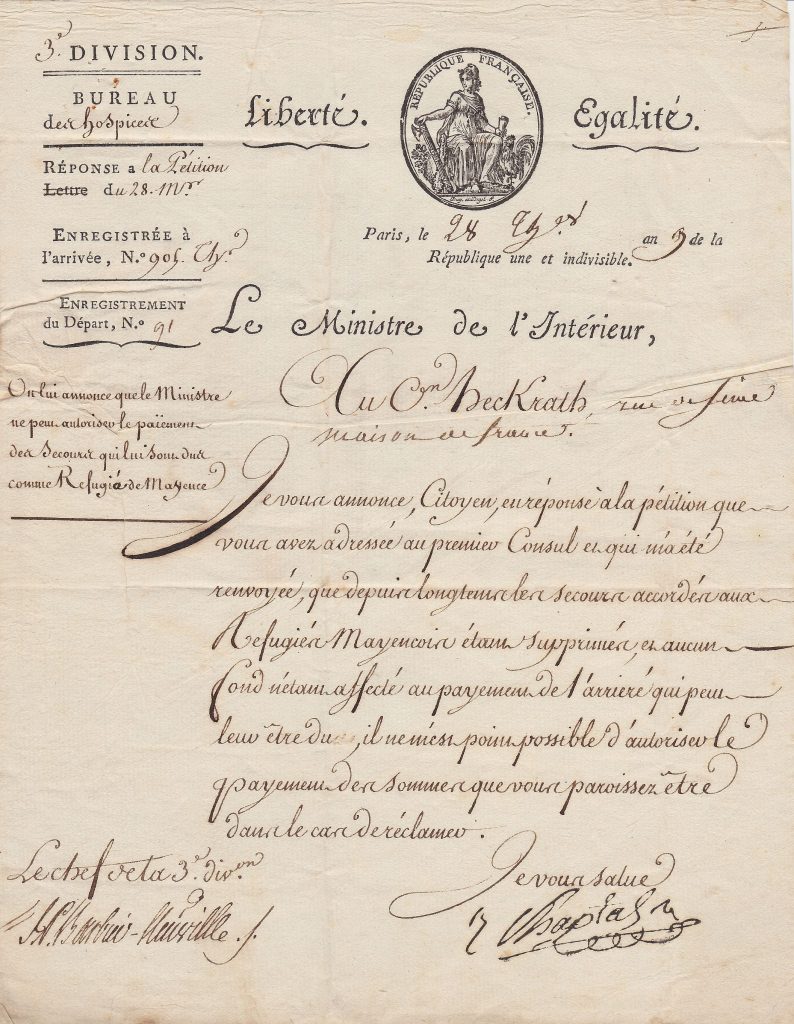
Letter from the Minister of the Interior

Passport for Edmund Ignatius Heckrath.
Children of Edmund Ignatius Heckrath & Maria M Nymphius:
Sebastianus Ignatius Jacobus Adolphus Heckrad 1760 – 1764
? Heckrad 1762 – 1762
Maria Margaretha Josepha Aloysia Heckrad 1764 – ?
Clara Thersia Aloysia Heckrad 1766 – ?
Maria Josepha Heckrad 1767 – ?
Maria Theresia Heckrad 1768 – 1826
Frideus Carolus Sebastianus Heckrad 1769 – ?
Ernst Jacob Heckrad 1772 – 1821
Catharina Aloysia Heckrad 1774 – ?
Maria Anna Margaretha Aloysia Heckrad 1777 – 1778
Sources:
City Archives, Mainz, Germany
City Pastoral Care, Mainz: St. Anthony: /St. Christoph
pinterest.com
Family documents
Legacy Pages for Heckrath family

Ernst Jacob Heckrath 1772 – 1821
Ernst Jacob Heckrath
1772-1821
Ernst Jacob Heckrath was my 3x great grandfather. He was actually christened Joannes Jacobus Heckrad in June 1772, in the Catholic church, St. Emmeran, and was one of a large family. His father was Edmund Ignatius Heckrath, who was born in 1736 and married Maria Margaretha Nymphius, and his grandfather was Sebastian Heckrad.
Ernst travelled to England and on to the Cape of Good Hope at 18 years of age where he stayed for a short time. Then he left for Bombay in a Man of War and was clerk on board. He mentions in a letter to his sister in 1798 that he had previously been to Cape Town. On his return journey from India he was again in Cape Town and in another letter writes of being about to marry when he had to leave suddenly “Unfortunately it was business that took me away from the arms of my love. Our marriage was going to be on the Saturday and on Tuesday I had to travel”. This was probably about 1794. [the letters mentioned have been handed down through the family and are written in an old German script, Sutterlin, which does not bear much resemblance to the present day German script. I was lucky to find a lady in the Archives in Maintz who was able to translate some letters to present day German. Then I had these translated to English]

Baptismal record for Joannes Jacobus Heckrad
He returned to Germany but could not find his father or sisters. [About this time there was great upheaval in Europe and especially in this area of Germany which was under the control of the French and later the Prussians. In 1797 the French returned under Napoléon Bonaparte and were there until 1814]
So he went to Holland, where he worked, and then on to England having been there previously on his travels. He said he would like to work in Germany and be near his father and sisters but his financial situation did not allow it. He could earn ten times more in England. He worked as a clerk from September 1795 to December 1798 for John Jackson, Secretary to Lord Keith, a rear admiral in the Royal Navy. During his time there he talks of looking for work and having interviews. In a letter dated July 1798 he mentions his sister, Maria Theresia, having given birth to a son and hopes they will stay healthy and that “our nearly extinct family will not die out but continue on”. [I think he would be amazed that 200 years on he has so many descendants!] He hopes his sister Maria Josepha will soon find a husband. He said he wasn’t successful in his job application and it was because he was a foreigner. He was disappointed at first but said “it is over now”. Also he mentions falling off his horse hitting his head and breaking his ankle …. “Nearly three weeks I was confined to bed but with the help of very good doctors I am able to limp around”. He also says not to refer to him as Monsieur as in England it means he is an apprentice of a master.
In 1798 he decided to go back to the Cape where he says he could earn good money and much more than he could in Germany. He asks for their letters to be sent through John Jackson, of Cavendish Square, London, stating that this was how they received his letters when he was away previously.
In 1799 he made a will, when in Portsmouth, before he left England.
He arrived in Cape Town on 9th December 1799 on the ship Lancaster. He decided to keep a letter book where he kept a record of all his letters he wrote. The ships, the letters were sent on along with the dates they sailed, were recorded in the margins. [This letter book is now in the Cape Archives, Cape Town]
Before he left England he organised a shipment of shoes and woolens to be sent to the Cape. He says the women’s shoes sold well but the men’s did not. The woolens arrived rotten and damaged so he claimed the insurance for them. He had a letter of introduction from John Jackson, secretary to Lord Keith, and as a consequence Lady Ann Bernard, the wife of the colonial secretary, invited him to her Weekly Assembly which was held at the Castle.
Seven weeks after his arrival at the Cape he married Elizabeth Theresia Siedel [I believe this was the lady he was going to marry previously when he had to leave suddenly] He writes in a letter ” I am since January married to a Miss Siedl & have now a very agreeable & pleasant life. My wife’s father, before he died, left her a small sum of money & some slaves which both came very welcome to me with their Mrs”.
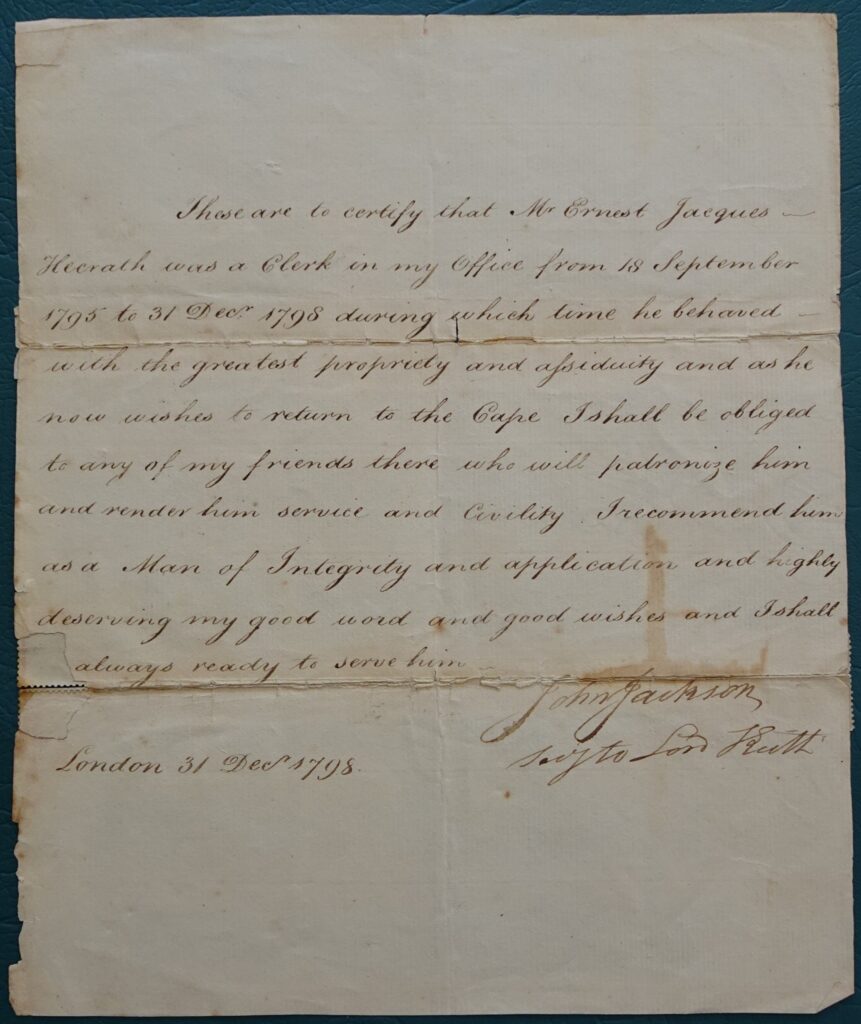
Letter of introduction for Ernst J Heckrath from John Jackson dated 31 Dec 1798
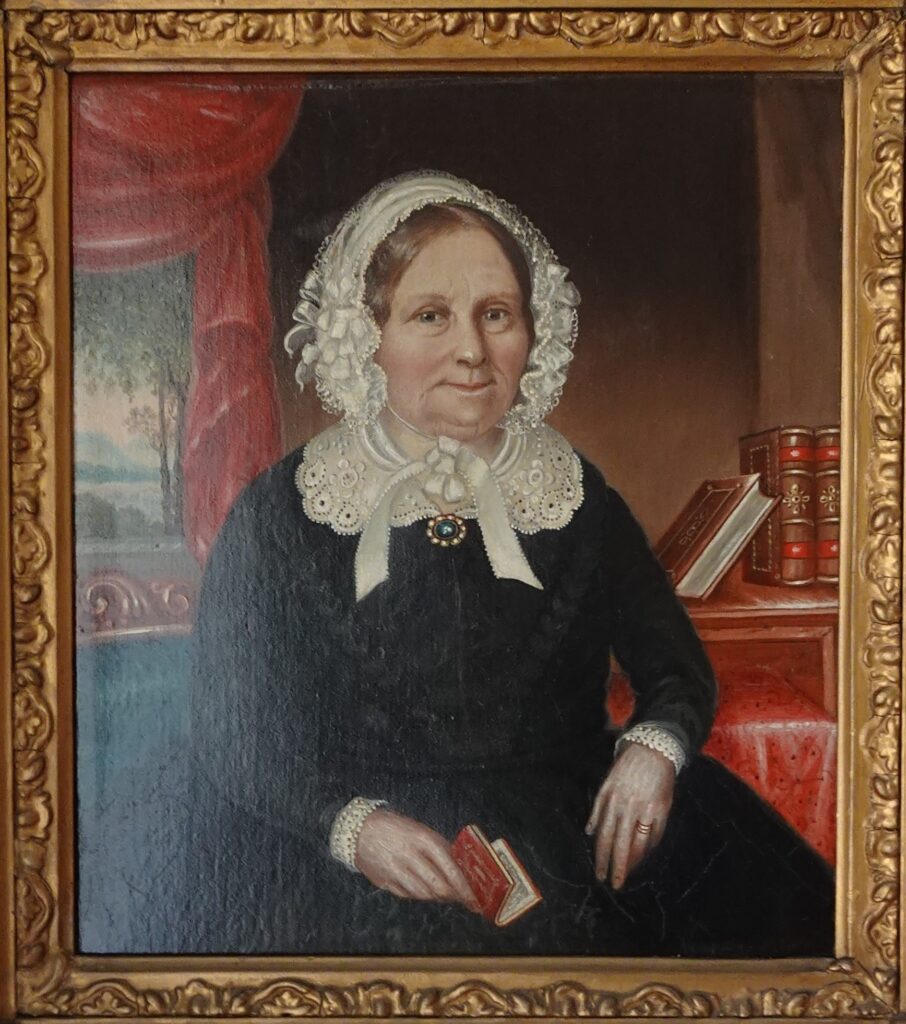
Elizabeth Theresia Heckrath née Siedel 1774 – 1857
They had 12 children of whom four died very young. In September 1809 he wrote to John Jackson “we had now together Seven Children ….. about 7 weeks ago Mrs. H brought me two daughters at once which are alive and well …. a hard case for a poor man; three daughters we lost, amongst one last September our first born 7 years old whose memory cannot be erased by either of us, all that remains are 2 sons and the two young twins. My eldest son is 6 years the youngest is 2½ …”
Their two sons were Adolph and Edmund. He sent his eldest son, Adolph, to school in England and relied on friends there to keep an eye on him and help when necessary. Four of his children eventually married and had families of their own.
He became a successful merchant until he had a fall at the end of 1815 after which his business suffered and he eventually became insolvent in 1819. He and the family lost everything. This included the seven slaves he owned three of which were children. He was very worried about his son in England and he wrote many letters to his friends in London to request they help and look out for Adolph. He wrote to Adolph in England “they have sold our house, our store, our small cottages, slaves, merchandises and Furnitures. Our dwelling is now in a hire house next door of your uncle Göpel. I have lost my employment by Mr W. Robertson because he has an Englishman which serves him for ⅓ salary which I used to have namely 200 Guins, how I shall be able, in my sickly state, to earn bread for my, your Mother, Sisters & brother God knows. I’ll advise you to take your father’s advice which is that you yourself must earn the bread that you are going to eat”.
He died two years later of an apoplectic episode [brain haemorrhage or stroke]. When he died in October 1821 he and the family were living at 9 Grave Street, Cape Town.
Four of his children eventually married and had families of their own.
[I have wondered myself how the letters and some of the very old documents I have came to be in my family. I was told by my mother that her grandfather, Edmund Walter Heckrath (Ernst’s grandson), went to Germany and found a family member, Mdm. Auguste Cyré of Darmstadt. Since the letters are those that Ernst wrote to his family and other letters written by friends to the family, I believe she gave the letters to him including the passport of his great grandfather and some other documents. Edmund related his visit in one of his short autobiographies. I also have a silver snuff box with the name Cyré engraved inside the cover. Ernst’s sister married Wilhelm Cyré. I believe Mdm. Cyré gave him this as well]

Letter from Ernst Jacob to his father Edmund dated 17 July 1798

Copy of the marriage certificate of Ernst Jacob Heckrath and Elizabeth Theresia Ziedel (Siedel) dated Feb 1915

Record of the slaves held by Ernst J Heckrath, with their names, ages, country of birth, when sold and to whom. Dated 17 March 1817

First page of the Copy Book belonging to Ernst Jacob Heckrath. Dates from 1799 – 1821
Children of Ernst Jacob Heckrath & Elizabeth Theresia Siedel:
Anna Margaretha Heckrath 1800 – 1808
Josepha Maria Heckrath 1802 – 1803
Adolph Heckrath 1803 – 1883
Margaretha Johanna Heckrath 1805 – 1807
Edmund Heckrath 1807 – 1843
Carolina Petronella Heckrath 1809 – 1880
Anna Elizabeth Heckrath 1809 – 1877
Josephina Theresia Heckrath 1811 – 1839
Margaretha Ernestina Heckrath 1813 – 1892
Elizabeth Theresia Heckrath 1817 – 1817
Susanna Clasina Heckrath 1819 – 1837
Maria Johanna Heckrath 1820 – 1886
Sources:
City Archives, Mainz, Germany
City Archives, Cape Town
Family documents and letters
Legacy Pages for the Heckrath family

Adolph Heckrath 1803 – 1883
Adolph Heckrath 1803-1883
My great great grandfather, Adolph, was born on 11 November 1803 the third child of Ernst Jacob Heckrath and Elizabeth Theresia Siedel.
In April 1815, at the age of 11½ years, he was sent to England in the care of Captain Napier on the East India Private Ship “Lord Hungerford”. The Captain was entrusted to deliver him to Mr. Francis Brothers Esq. at the office of Sir John Jackson. [John Jackson was knighted in 1815] Mr Brothers, who lived in Kensington, was a friend of his father and had previously told Ernst he would look after his son and send Adolph to the same school as his boys attend in England. Ernst says in a letter to Francis Brothers “…. I may freely tell you and if I am not mistaken he is not an ignorant. He is rather sharp but wants close looking after. His mind is free but rather inclined to vice. Mr Hopley, the Master of the Grammar School here, observes and strongly recommends that an English boarding school will be of the utmost benefit to him; he being there sharply looked after and has no opportunity of bad company ….” Ernst expected the annual expenses to be no more than £50.
In May 1815 Adolph was sent to Mr. Young’s Academy, Church Street, Reading, Berkshire. He appears to do quite well in mathematics judging by his exercise book from August 1817. He learnt about Inverse Proportion, Compound Interest, Tare and Tret, Brokage, Rebate and Discount, Barter and Profit and Loss to name some in the book. For each subject there are examples. [He appears to have enjoyed writing the headings with his quill pen!]
In 1816 he received a letter from his father who wrote “….. boy apply yourself, learn the French language, apply yourself to music. Your sister Caroline plays well on the piano, Edmund on the fiddle, Ann on the harp and you play, I suppose, with your fingers, pray do learn French and Music. Edmund learns French … “.
On 15 February 1819 his father wrote to Adolph saying that because of his illness Adolph would have to “… take your father’s advice which is that you yourself must earn the bread that you are going to eat … “. This most probably would have been quite a shock to him but his father also said “My friends to whom I am writing by this opportunity & which letters I am sending to them, to say to Sir John Jackson, Mr Francis Brothers & Mr Hardy, will I hope give you their advice how you are to go on in this world … ” He also mentioned in the same letter he and his mother were upset Adolph had not written and thanked his mother for a box of dried fruit and a small box of apricot jelly they had previously sent to him.
Accompanying this letter was “… a sealed parcel which contains 1 gold Guinea, one whole & five half crowns & 4½ps English shillings …” He’s told to use the money sparingly because his parents have nothing more. His father goes on to say that “…. they have sold our house, our Stores, our Small Cottages, Slaves, Merchandises & Furnitures …. our dwelling is now in a hire house next door of your uncle Göpell.”
Adolph returned to the Cape and, with the help of his father writing to his friends, he obtained a position as a clerk in Uitenhage with a Mr Silkenbauer. In March 1820 he sailed to Algoa Bay on route to Uitenhage. In April he wrote to his father to say that he was perfectly well situated and very busy. Ernst asks him to him a copy of a Chart or a Map of the Interiors. Also he says “… it would be to all Inhabitants a great treat to have a Chart of the Coast as well as of the inner roads to all different Drosdys & different denominations of the Bays, Rivers, Hills, Woods & the abodes of the most noted inhabitants …” Ernst also mentions his mother not being well “… your Mother was, since you left us, twice almost invisible occasioned by the distemper to which she so frequently is subject to de Roos, pray & obtain from some good country woman a remedy because I fear if the Roos continues so, as has been hitherto the case, you will have to lament the loss of a tender Mother …”
On 6th May 1820 Ernst wrote to Adolph to tell him he had received a letter “… by the ships lately arrived in Simonsbaay with Settlers for Zuurveld and they will sail in a few days for Algoa Bay. A Gentleman named Mr Pringle, who is arrived at the head of a party of North Country Men, is going there with his party to settle there & has delivered me a Letter from Mr Niven requesting me to aid & assist Mr Pringle in his enterprize. I mentioned to Mr Pringle that you, my son, were at Uytenhage in a Mercantile affair as a Clerk & there you know both languages & something acquainted with the Folks there that you might be of service to him. Mr P was glad to hear it & will take this Letter as his introduction to you” [In 1978 I met a South African man in London and, having recently returned from there, asked him about his family history. He said his ancestor was a Mr Thomas Pringle and one of the leaders of the 1820 Settlers! I told him that my ancestor had met his! I gave him a copy of the letter above.]
Adolph continued working in Uitenhage for about six months when in a letter dated 24th October his father wrote “… write to me distinctly the reasons why you quitted your situation in order to satisfy my anziety and to be able to defend you when I shall be required to do so …” I do not know where he was employed after this but eventually he returned to Cape Town.

Photocopy of the inside cover of Adolph’s maths book

Photocopy of page on Barter from Adolph’s maths book
On 1st December 1834 he married Charlotte Rebecca Smith. This was the date slavery ended at the Cape. The witnesses were Charlotte’s uncle, James Smith, her sister Sarah Elizabeth Smith and Adolph’s brother-in-law’s brother, James Bennett Kift. [J.B.Kift’s daughter later married Adolph and Charlotte’s youngest son] They had 8 children – five boys, two of which died very young, and three girls. It was said that if any young men came to the door to see the girls Adolph answered and scared them away! Needless to say none of them married. Their eldest son Ernest John became a Mariner and died in May 1870 after catching a cold and then developing bronchitis. Only two of the boys, James Adolph and Edmund Walter, married and had families.
Adolph had various occupations such as a ship’s chandler, a book keeper and owning a boating establishment.

Charlotte Rebecca Heckrath née Smith
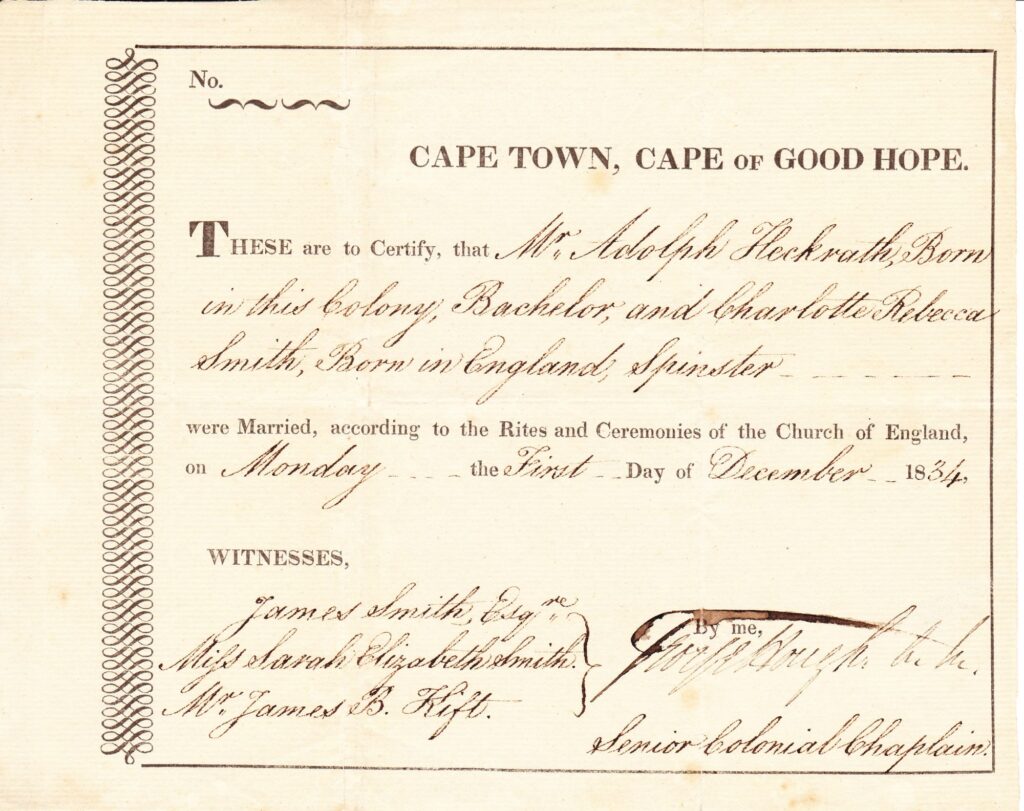
Original marriage certificate of Adolph Heckrath and Charlotte Rebecca Smith. Dated 1 December 1834
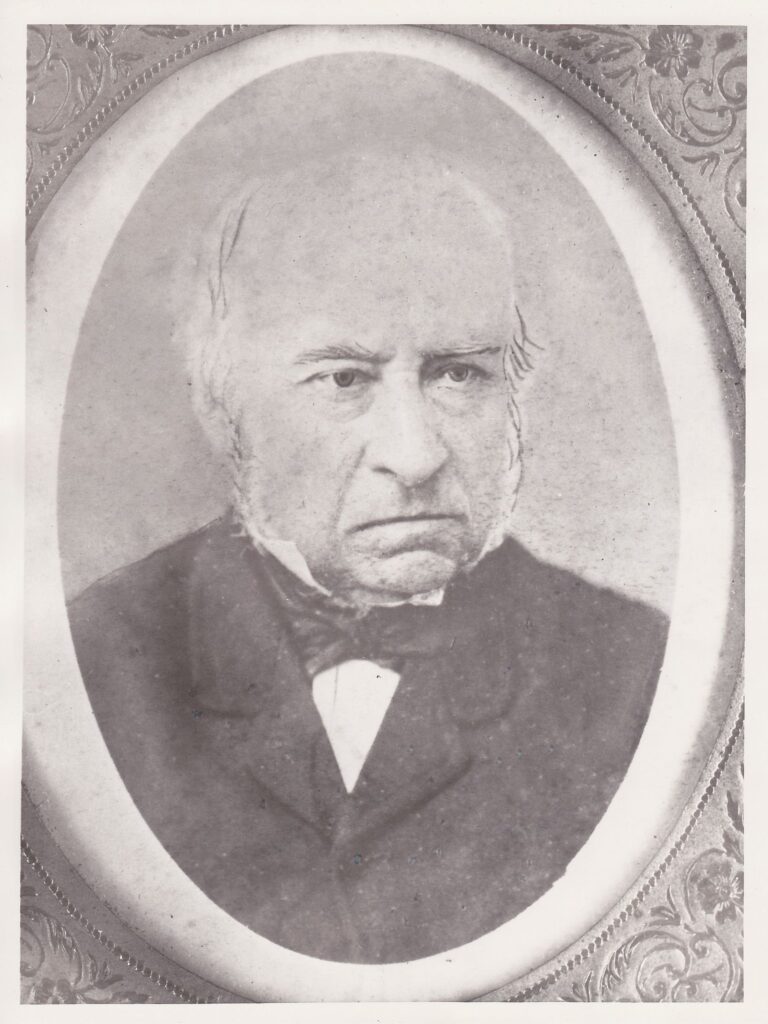
Adolph Heckrath 1803- 1883
In a letter written in 1877 to his son Edmund, who was in Kimberley, he talks of the Eastern question continuing to occupy the public prints in Europe. He says ” the Turk will not part with territory whatever other obligations the Turk will be obliged to submit to, the result of the conference sitting at Constantinople, but whether diamonds will rise in price whatever the result of the Eastern question is doubtful” He also mentions a North Pole expedition where they talk of using a Balloon to reach the Pole. He thinks it “absurd and foolhardy – unless precious lives are sacrificed some of the public are not satisfied”.
In the same letter he relates how he collapsed after a walk and became unconscious. When he woke he said the doctor was in attendance and “…it was presumed I got sun stroke. I feel in a state of great debility still and take tonics ….. my rupture continues to trouble me but since I do not move about much I do not feel much anxiety on that score” [The rupture most likely would have been a hernia]
He died, aged 80, on 25 November 1883 and was buried in the English Cemetery, Somerset West, Cape Town.
Children of Adolph Heckrath & Charlotte Rebecca Smith:
James Adolph Heckrath 1835 – ?
Ernest John Heckrath 1837 – 1870
Adolph Heckrath 1839 – 1841
Sarah Elizabeth Heckrath 1841 – 1917
Maria Grindley Heckrath 1844 – 1921
James Adolph Heckrath 1846 – 1897
Edmund Walter Heckrath 1848 – 1935
Anna Carolina Heckrath 1850 – 1920
Sources:
City Archives, Cape Town
Family documents and letters
Legacy Pages for the Heckrath family
